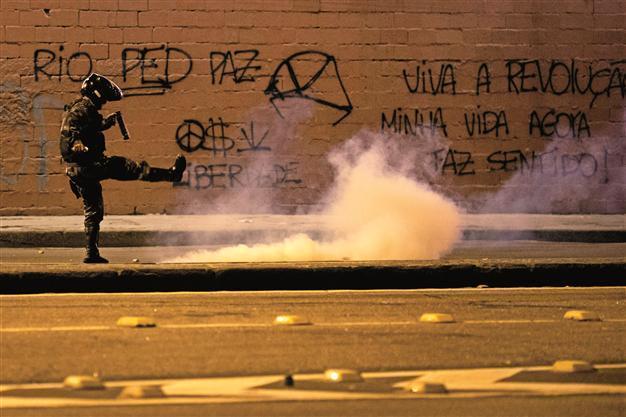Brazil protesters try to define next steps as protests continue
SAO PAULO - The Associated Press

“We have politicized Brazil and there’s no turning back from that.” AP photo
After a week of mass protests, Brazilians won both the world’s attention and a retreat on the subway and bus fare hikes that had first ignited their rage. But many say the real work is just beginning.
Middle-class protesters marching for the first time say the challenge for Brazilians is to keep alive the political spirit that was awakened in the last week, after decades of apathy. They say they hope leaders emerge at the forefront of an eclectic mass movement and present concrete demands to national and state governments.
In short, protesters say it’s time to organize around their flurry of grievances, ranging from ending government corruption to improving public education, health care and public safety.
‘Leaders will emerge’“I think leaders will emerge but in smaller groups,” said secretary Juliane Furno, while standing under a banner in Sao Paulo June 20 reading “Only struggle changes life.”
“We’re all taking the experiences of the past week back to our universities, communities and workplaces. I think things will calm down now but we have politicized Brazil and there’s no turning back from that. We won’t return to the Brazil of last week.” Despite such enthusiasm, Brazil’s protesters face a dilemma that has bedeviled modern social movements in Latin America and beyond. If protests focus too narrowly on single issues such as bus fares, they risk losing steam when the issue is addressed.
And if they embrace too many issues, they risk spreading themselves too thinly to achieve any of their goals.
The U.S.-based Occupy movement, for example, failed to turn outrage over Wall Street corruption last year into a focused political force. Demonstrators in Egypt did manage to oust leader Hosni Mubarak but have since struggled to stay unified. On top of that, having emerged from dictatorship only three decades ago, Brazil has no strong national civic groups that could naturally assume leadership of the protests.
The protests in Brazil are fresh and still running on adrenaline. More than one million Brazilians poured into the streets of at least 80 cities on June 20, facing tear gas, pepper spray and rubber bullets. A protester died in Sao Paulo late after being run over by a car, police said. Police said the victim died after a motorist hit him and two other protesters in the city of Ribeirao Preto, located 330 kilometers from Sao Paulo.
President Dilma Rousseff, who cancelled a trip to Japan planned for next week, has called for an emergency cabinet meeting with top advisers to discuss the massive street protests rocking the country.
Mainstream media slammed for protest
SAO PAULO – Agence France Presse
Brazilians are also angry at the media, like in Turkey, including the influential Globo network, accused of belittling their movement. The rare display of “people’s power” has received blanket media coverage, particularly by Globo, the world’s second-largest commercial TV network. “Globo manipulates facts and tries to put the demonstrators in a bad light, focusing on the vandalism of a few hooligans,” said Leitane Luranque, a demonstrator. Disillusionment with mainstream media has led many young protesters to turn to social media sites for news.
